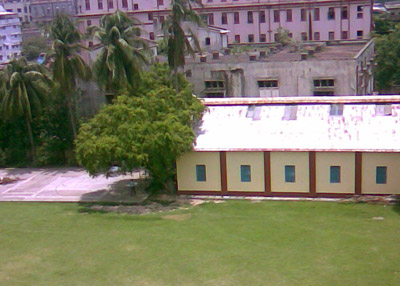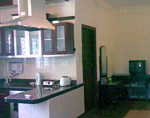Another World: Armenians in Far-Off India
Hermineh Adamyan
Early on the morning of June 7, 2009, I started my day in Yerevan and wound up in faraway Calcutta (Kolkata). Back in Armenia, I had some inkling of where I was headed to. Everyone who at least has a cursory familiarity with India knows that it is a nation with extreme contrasts which makes it hard to adapt to, especially if you realize that you will be spending the next year there.
The real India is far removed from the images one gets from Bollywood movies. In fact, it is hard to believe that the totality of India could ever be depicted in these romantic and dreamy films I got my first serious impression during the flight from Dubai to Calcutta. It seemed that we had already reached Calcutta while still in the plane. It was the behavior of the Indian passengers, rather than their dress, that left this impression on me. During the flight of several hours, the cabin was transformed into veritable Indian restaurant mishmash. After filling out the health form at Calcutta International Airport, which left less than a lasting impression, designed to prevent the entry of infectious diseases, we entered the arrivals hall. It soon became apparent that we would also have to bear with the unfamiliar oppressively humid heat that seemed to wrap around your feet and engulf you when you stepped outside. You felt that you could suffocate at any moment. My new colleague, Ms. Anjela, a song and dance instructor, appeared to have felt the same way. Both of us displayed clear feelings of unpreparedness about the place. We’d periodically turned to each other in bewilderment and asked “Where the heck are we going?” in an attempt to makes some sense of the situation. We were met by Very Reverend Father Khoren Hovhannisian, Manager of the Armenian Philanthropic Academy (commonly known as the Armenian College) in Calcutta and religious leader of the Indian-Armenian community. Apparently noting our confusion and irritability, he tried to put us at ease by joking, “I hope you’ve brought warm clothes, it’s pretty cold here.” The heat was so overbearing that for a moment we hoped he was right. But the self-deception was short-lived when we stepped outside on to the street. What startled me the most was the constant blaring of car horns, an ear-piercing clamor, so prevalent in big metropolitan cities. Then too, traffic flowed on the left, in the English tradition, and it seemed to us that we were marching against life’s normal flow. Traffic signs were posted but no one paid any attention; utter confusion reigned on the streets. To break the thread of agitation I was experiencing, I tried to focus in on some interesting sidewalk scene as a diversion but quickly realized that I had trespassed into people’s homes, where they ate, slept and bathed. I thought to myself – My God, how can anyone possibly live like this? This stifling street would lead us to Mirza Ghalib Street where the Armenian College, our home and workplace for the next year, is located. Security staff opened the gates leading to the school and our car drove through. I immediately remembered the words uttered by Catholicos Garegin II during our meeting, “You will see both heaven and hell…” Truly, it was another world inside the gates, with its manicured lawns, buildings, playground and swimming pool. It was all clean and tidy. Father Khoren showed us to our rooms on the fifth floor. Teachers’ quarters comprise a portion of the top floor; the rest is a huge balcony.  The magic of the place pushed my initial impressions of India to the background. For a moment it seemed that we had wound up in some western hotel with all the modern amenities. A place where a teacher could concentrate on her work and the staff would take care of all other mundane issues.
The magic of the place pushed my initial impressions of India to the background. For a moment it seemed that we had wound up in some western hotel with all the modern amenities. A place where a teacher could concentrate on her work and the staff would take care of all other mundane issues.  Even though we were exhausted after our long journey, the comforts of our new apartments gave us a second wind. We were introduced to the cuisine of India, known for its extensive use of spices, for the first time. The next morning after breakfast we decided to take a tour of our new surroundings. Everything was superb. We met some of the students who weren’t of on vacation which they can take once every three years. They impressed us with their discipline and pleasant demeanor. Everyone left us with positive impression; from the workers to the school’s manager. It was hard not to notice the upsides to it all. It wasn’t by accident that you got to thinking that such an agreeable state of affairs could last a lifetime, that is until you walked outside the gates, and were jolted back to reality by the extreme poverty, sharp odors and polluted air. We braved entering this reality on our second day in Calcutta. We decided to go out and buy some clothing better suited for the Indian climate. What’s amazing is that when you walk the streets you are confronted with mobs of people who either want to solicit you or sell you something. Half-naked street vendors squatting on the pavement where they sleep and bathe hawk their food items, seemingly unaware that it’s covered with flies. There are homeless children all over, who tug at your clothes begging for money. You’re forced to hand over some change otherwise they’ll keep following you, especially if they spot you leaving a store and know that you have money to spare. When we finally made our way back to the school, we made up our minds that the next time we’d leave the grounds of the college was to go to the airport for our return journey to Armenia. As you can see, our foray into the outside world that day made a lasting impression on us.
Even though we were exhausted after our long journey, the comforts of our new apartments gave us a second wind. We were introduced to the cuisine of India, known for its extensive use of spices, for the first time. The next morning after breakfast we decided to take a tour of our new surroundings. Everything was superb. We met some of the students who weren’t of on vacation which they can take once every three years. They impressed us with their discipline and pleasant demeanor. Everyone left us with positive impression; from the workers to the school’s manager. It was hard not to notice the upsides to it all. It wasn’t by accident that you got to thinking that such an agreeable state of affairs could last a lifetime, that is until you walked outside the gates, and were jolted back to reality by the extreme poverty, sharp odors and polluted air. We braved entering this reality on our second day in Calcutta. We decided to go out and buy some clothing better suited for the Indian climate. What’s amazing is that when you walk the streets you are confronted with mobs of people who either want to solicit you or sell you something. Half-naked street vendors squatting on the pavement where they sleep and bathe hawk their food items, seemingly unaware that it’s covered with flies. There are homeless children all over, who tug at your clothes begging for money. You’re forced to hand over some change otherwise they’ll keep following you, especially if they spot you leaving a store and know that you have money to spare. When we finally made our way back to the school, we made up our minds that the next time we’d leave the grounds of the college was to go to the airport for our return journey to Armenia. As you can see, our foray into the outside world that day made a lasting impression on us.
To be continued
 Videos
Videos Photos
Photos
Write a comment